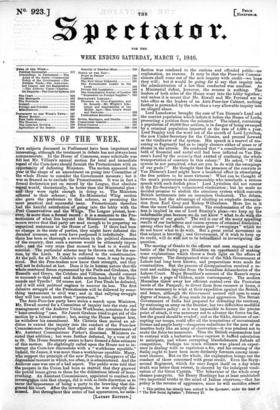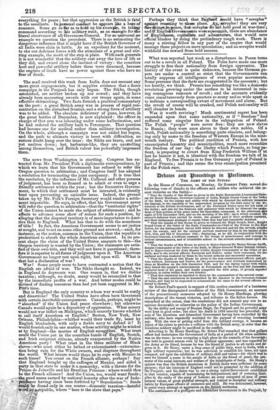NEWS OF THE WEEK.
TDB subjects discussed in Parliament have been important and interesting, although the treatment in debate has not always been commensurate. In the House of Commons, some solicitude was felt lest Mr. Villiers's annual motion for total and immediate repeal of the Coria-laws should furnish the Protectionists with an opportunity of defeating Ministers. The motion appeared this year in the shape of an amendment on going into Committee of the whole House to consider the Government measure ; but it was so framed as to exclude the Protectionists. It was in fact a formal declaration put on record by the League, that absolute repeal would, theoretically, be better than the Ministerial plan : and they were right enough in doing so. The Ministers adhered to their scheme ; the Ex-Ministerial Whig section also gave the preference to that scheme, as promising the most practical and successful issue. Protectionists therefore had the hateful satisfaction of going into the lobby with the Peel Conservatives and the Whigs. The League protest, how- ever, is more than a formal record : it is a memento to the Pro- tectionists of what lies beyond the Ministerial measure. Ru- mours revive that that party are mad enough to be preparing an organized resistance in the House of Lords. If there had been no change in the state of parties, they might have defeated the dreaded measure, and even have postponed it indefinitely. But there has been so thorough a revolution in the political elements of the country, that such a success would be ultimately impos- sible and the very steps that seemed to lead to it would. be suicidal. The particular scheme may be thrown out, for the ses- sion, by the Lords. It may be referred to the constituencies. At the poll, for all Mr. Cobden's confident tone, it may be nega- tived. But the Free-traders now know their strength, and they will not be defeated at last. Does it lie in human, nature that the whole combined forces represented by the Peels and Grahams, the Russells and Greys, the Cobdens and Villierses, should consent to succumb to that small and feeble section headed by the Rich- monds and Tyrells ? Of course not. Let Free Trade be defeated, and it will seek political engines to recover its loss. The first -delusive struggle of the Protectionists will be followed by some- thing tantamount to civil war ; and in that rallying struggle they will lose much more than " protection." The Anti-Poor-law party have stolen a march upon Ministers. Mr. Etwall moved for a Committee of inquiry into the state and management of the Andover Union Workhouse, notorious for the 4‘ bone-crushing " case. Sir James Graham tried to get rid of the motion by a formal evasion ; but, seeing the House against him, he withdrew his amendment. Mr. Christie then moved an ad- dition to extend the inquiry into the conduct of the Poor-law Commissioners throughout that affair and the circumstances of Mr. Assistant Commissioner Parker's dismissal. Ministers re- sisted that addition • but were further defeated, by a vote of 92 to 69. The Home addition; seems to have formed a false estimate of this motion. He slightingly called upon the House not to in- terrupt the Corn-law discussions with a workhouse squabble." Indeed, Sir James, it was more than a workhouse squabble. Many, who support the principle of the new Poor-law, disapprove of the dogmatical manner in which, too often, it is administered. And the Andover case was one of a bad aspect. The public were told that the paupers in the Union had been so starved that they gnawed the putrid bones given to them for the deleterious labour of bone- crushing. An Assistant Commissioner, appointed to conduct the investigation into that charge, did it with so little discretion as to incur theappearance of being a party to the brawling that dis- graced his court. After the investigation, he was abruptly dis- missed. But throughout this series of bad appearances, no sada- faction was rendered to the curious and offended public—no explanation, no reasons. It may be that the Poor-law Commis- sioners shall come out of the new inquiry with credit—we hope they will ; but it would be going far to say that inquiry into the administration of a law thus conducted was needless. As a Ministerial defeat, however, the reverse is nothing. The leaders of both sides of the House went into the lobby together; and unless it is meant that Mr. Etwall and Mr. Ferrand are to take office as the leaders of an Anti-Poor-law Cabinet, nothing further isrtended by the vote than a very allowable inquiry into an alleged po abuse. Lord Lansdowne brought the case of Van Diemen's Land and the convict population which infests it before the House of Lords, presenting a petition from the colonists.* The island, containing a population of 40,000 free settlers, is in danger of being swamped by a criminal population imported at the rate of 4,000 a year. Lord Stanley took the word out of the mouth of Lord Lyttelton, the new Under Secretary for the Colonies, and pressed forward as the vindicator of the system. His speech is a marvel of rea- soning so flagrantly bad as to imply absence either of sense or of shame in the utterer. He confessed that " a considerable amount both of financial and social evil had been inflicted on Van Die- men's Land by the necessity that existed of confining the whole transportation of convicts to this colony." He asked, " If this system be not permitted, what are you to do with the sweepings of our gaols ?" He thought that the presence of the convicts in Van Diemen's Land might have a beneficial effect in stimulating the free settlers to be more virtuous ! What can be thought of the man's pretensions to statesmanship who interlards a serious
speech with such foolish pleas ? Lord Lyttelton did not concur in the Ex-Secretary's volunteered vindication; but he made no decided promise to abolish the atrocious system which convert& British settlements into an unsunken Gomorrah. The debate, however, had the advantage of eliciting an emphatic denuneia- don from Earl Grey and Bishop Wilberforce. More lies in it than the mere Colonial question. The condemnation of the sys- tem is implied in one of Lord Stanley's pleas—we keep up the
indefensibleplan because we do not know " what to do with the sweepings of our gaols." The evil is one of the many appalling results of our barbarous and coarse system of criminal 'discipline : among other bad effects, it creates gaol " sweepings" which we do not know what to do with. But a great social movement on that subject is brewing ; and Government, if it wish to keep up its credit, will do well not to be behindhand in investigating the question.
The moving of thanks to the officers and men engaged in the battle of the Sutlej gave Ministers an opportunity of making some explanations which throw a fresh hght on the affairs of that quarter. The disorganized state of the Sikh Government at Lahore had long been known, and preparations were made for eventualities. But the process of disorganization received a re- cent and sudden impulse from the boundless debaucheries of the Lahore Court. Major Broadfoot's account of the Ranee's orgies reads like a page of Gibbon, made contemporary. The modern Messalina threw away her efficient control over the Praetorian bands of the Punjaub ; to divert them from excesses at home, it became necessary to wink at their expedition against the British ; and hence, although the Government seemed still open to some degree of reason, the Army made its mad aggression. The British Government of India had prepared for defending the territory, by stationing an army on the frontier; but two difficulties modified that defensive policy : as it was impossible to foresee the precise point of attack, it was necessary not to advance the forces too far, lest the guard should be evaded ; and as the Sikhs, desirous of cor- rupting our troops, could offer all the temptations of unrestrained licence and ample booty—dangerous seductions for the men of an inactive body like an army of observation—it was prudent not to make the force too numerous. Thus the British commanders had to contend With a barbarian whose caprices it baffled calculation to anticipate, and whose corrupting blandishments forbade all competition. Perhaps too much reliance was placed on e - ence in dealing with so capricious a foe, and his crossing of the Sutlej ought to have been more distinctly foreseen among immi- nent chances. But on the whole, the explanation brings out the conduct of those concerned with great credit. Even the Sixty- second Regiment, which for once forgot itself on a day when death was better than retreat, is cheered by the indulgent vindi- cation of the Great Captain. ' The behaviour of the whole army shames panegyric. Sir Henry Hardinge has at least established two important truths in the mind of Indian observers?—that his policy, is the reverse of aggressive, since he will sacrifice aka* * This petition hits already been noticed in the Spectator, under the head at " The New Social Agitation'; February 21. everything for peace ; but that aggression on the British is fatal to the assailants. InisensKtal conduct he -appears like a ham of romance. Some go soar as to hold up his example, /in takielg command according to his military rank, as an earample for the literal observance of -allOovernors-General. For so universal on example we question the precedent. There is no estimating the dangerous influence that it might have if the British Governor of all India were slain in battle. As an expedient for the moment, to eke out deficient forces with the stimulant of a great and stir- ring example, the merit of the step is plain. With such generals it is not wonderful that the soldiery cast away the love of life as they did, and owned alone the instinct of victory : the countless host and powerful artillery before them were disarmed, because the engines of death have no power against those who have no fear of death.



























 Previous page
Previous page